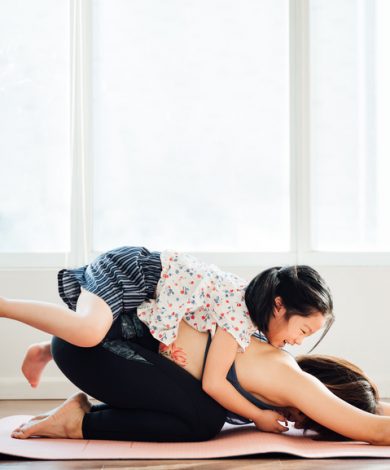We don’t talk about how lonely motherhood is. Or maybe we do, but not nearly…
Mindset
Postpartum Anxiety Prepared Me to Mother a Child With Special Needs
August 23, 2021 • By Jess Quarello

Four months after the birth of my first daughter, Charlee, I was diagnosed with postpartum anxiety. And I was shocked because I thought essentially being a nervous wreck was a normal part of motherhood.
Wasn’t it normal to always be “on” and unable to relax? To be extremely triggered by clutter? To be filled with worry about the possibility of her crying while I was in line at the grocery store? For something as simple as packing the diaper bag and taking her out of the apartment had the potential to put me over the edge?
I was constantly in my head, grappling with intrusive thoughts, and never present.
The truth is, I had no idea I was suffering. I was so deep in my anxiety. Thankfully, a nurse came running out of the pediatrician’s office after reviewing my EPDS questionnaire which stands for “Edinburgh Postnatal Depression Scale.” Each of the ten questions ask about your emotional and physical state as a new mom in terms of the past seven days. I answered honestly.
The nurse took me back to the doctor’s office and told me that it is totally normal to feel those things and that based on my answers to the questionnaire, she would recommend that I speak to a therapist. Again, I was shocked! I had no idea I was feeling anything outside the normal “another human recently tore their way out of my body and I don’t know what day it is” new mom experience.
I decided to take the advice and made an appointment with a therapist. This was the best decision I made postpartum. My therapist confirmed that I had postpartum anxiety and we used cognitive behavioral therapy to help me to control my thoughts in a more productive way. Within three months, I had the tools I needed to manage my anxiety. I made tremendous progress and began my journey of becoming a less anxious mother.
Fast forward to July of 2020. I was 9 months pregnant with my second daughter, Adeline. She had passed her first trimester screening and grew on track for my entire pregnancy. And I was anticipating welcoming a perfectly healthy daughter who would be the last piece of the puzzle to complete our family.
What I was absolutely not expecting was a daughter with special needs, or Down Syndrome. But hey that’s how life works. Adeline was diagnosed with Down Syndrome almost immediately based on her physical markers and then officially three days post birth.
As you can imagine, the mental health strain from my traumatic birth diagnosis was astronomical. That said, I knew that I needed to ask for help. I scheduled emergency sessions with my therapist starting the day Adeline was born. My husband and I did therapy together during the mourning period and as we continued on our healing journey together.
It took time, but I was able to get to what I like to call “the other side” of Adeline’s diagnosis in an effective and efficient way. I know that without experiencing my first birth and the anxiety that followed, I would never have been able to get to the other side so quickly. I had the tools necessary to know I needed to get support and start adding to my toolbox.
I was able to stop fearing the future and to embrace the gift that is mothering a child with special needs. I look back and think of my postpartum anxiety following Charlee’s birth as a sort of blessing. God knew I was going to need to depend on the support of others with Adeline and he made sure it happened earlier in my life so I’d be ready.
My advice for anyone looking for answers is to ask for help. It does not make you weak. In fact, I would argue that reaching out is the strongest thing you can do. To be vulnerable is to know yourself in a way that others wish they could know themselves. I’m proud of reaching out. And I’m proud of the woman and mother I am today. I am better because of these challenges. These experiences have gifted me a humble and blessed heart.



